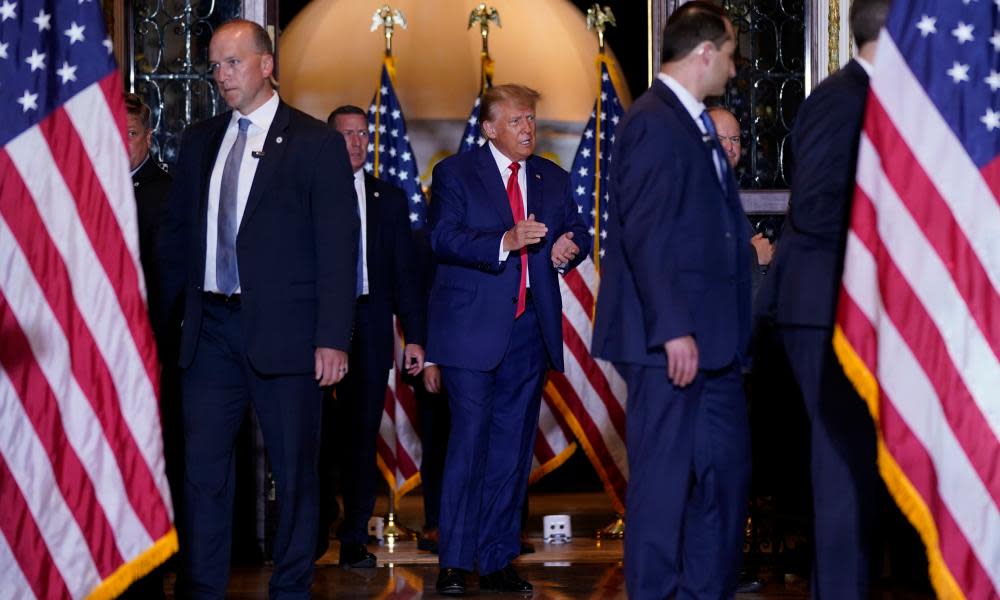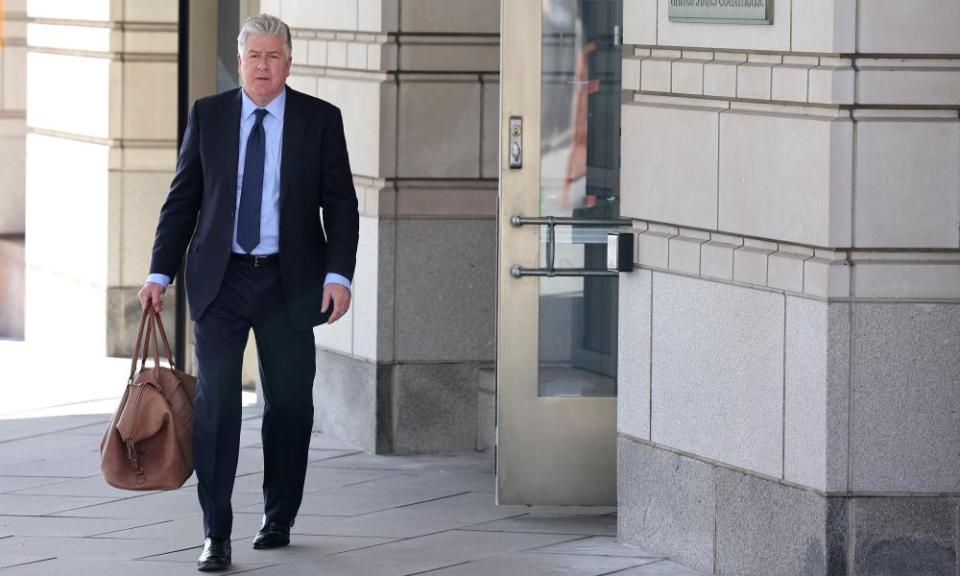Trump was warned about retaining classified documents, notes reveal

- Oops!Something went wrong.Please try again later.
- Oops!Something went wrong.Please try again later.
Federal prosecutors have evidence Donald Trump was put on notice that he could not retain any classified documents after he was subpoenaed for their return last year, as they examine whether the subsequent failure to fully comply with the subpoena was a deliberate act of obstruction by the former president.
Related: FBI broke own rules in January 6 and BLM intelligence search, court finds
The previously unreported warning conveyed to Trump by his lawyer Evan Corcoran could be significant in the criminal investigation surrounding Trump’s handling of classified materials given it shows he knew about his subpoena obligations.
Last June, Corcoran found roughly 40 classified documents in the storage room at Mar-a-Lago and told the justice department that no further materials remained at the property. That was later shown to be untrue, after the FBI later returned with a warrant and seized 101 additional classified documents.
The federal investigation led by special counsel Jack Smith has recently focused on why the subpoena was not compiled with, notably whether Trump arranged for boxes of classified documents to be moved out of the storage room so he could illegally retain them.
In particular, prosecutors have fixated on Trump’s valet Walt Nauta, after he told the justice department that Trump told him to move boxes out of the storage room before and after the subpoena. The activity was captured on subpoenaed surveillance footage, though there were gaps in the tapes.
The warning was one of several key moments that Corcoran recounted in roughly 50 pages of notes he dictated that were described to the Guardian over several weeks by three people with knowledge of their contents, which prosecutors have viewed in recent months as central to the criminal investigation.
The notes revealed how Trump and Nauta had unusually detailed knowledge of the botched subpoena response, including where Corcoran intended to search and not search for classified documents at Mar-a-Lago, as well as when Corcoran was actually doing his search.
Although ordinarily off limits to prosecutors, the notes ended up before the grand jury in Washington hearing evidence in the case after a US appeals court allowed attorney-client privilege to be pierced because judges believed Trump might have used Corcoran’s legal advice in furtherance of a crime.
The notes described how Corcoran told Nauta about the subpoena before he started looking for classified documents because Corcoran needed him to unlock the storage room – which prosecutors have taken as a sign that Nauta was closely involved at essentially every step of the search.
Corcoran then described how Nauta had offered to help him go through the boxes, which he declined and told Nauta he should stay outside. But going through around 60 boxes in the storage room took longer than expected, and the search ended up lasting several days.
The notes also suggested to prosecutors that there were times when the storage room might have been left unattended while the search for classified documents was ongoing, one of the people said, such as when Corcoran needed to take a break and walked out to the pool area nearby.
In addition to his exchange with Trump, Corcoran described Trump’s facial expressions and reactions whenever they discussed the subpoena. The unusually detailed nature of his notes is said to have irritated Trump, who only learned about them after the notes themselves were subpoenaed.
The notes did not address why Corcoran only looked in the storage room, though he separately testified to the grand jury that while Trump did not mislead him about where to search, he did not say where to search either. The New York Times earlier reported a summary of his testimony.
Corcoran did not respond to a request for comment. A spokesperson for the special counsel’s office declined to comment.

Constructing an obstruction case remains challenging, and prosecutors would need to show that Trump arranged for Nauta to remove boxes he expressly knew contained classified documents demanded by the subpoena, with the intention of concealing them from his lawyer’s search.
Trump’s legal team have consistently said the subpoena response was incomplete because Corcoran was not as thorough as he should have been, in part because he left it until right before the deadline and only realized when he got there just how many boxes were in the storage room.
A Trump spokesperson has previously said of the investigation: “This is nothing more than a targeted, politically motivated witch-hunt against President Trump that is concocted to meddle in an election and prevent the American people from returning him to the White House.”
To resolve the issue about the gaps in the surveillance footage, the special counsel most recently subpoenaed Matthew Calamari Sr, the Trump Organization’s security chief who became its chief operating officer, and his son Matthew Calamari Jr, the director of corporate security.
Both Calamaris testified to the grand jury earlier this month, the Guardian previously reported, and were questioned in part on a text message that Nauta had sent asking Calamari Sr to call him back about the justice department’s request for the tapes last year.
The justice department interviewed Nauta several times last year until prosecutors grew concerned that he failed to provide them with a complete and accurate account of his role in moving boxes that contained classified documents, according to two people familiar with the situation.
To force his cooperation, prosecutors threatened to charge him with lying to the FBI after he gave differing accounts over several interviews. But that incensed Nauta’s lawyer, who told the justice department his client would not talk again unless he was charged or offered an immunity deal.
After losing Nauta, investigators have turned to other witnesses who could shed light on his role. In recent interviews, they have asked whether Nauta removed boxes containing classified documents when he was in the storage room at the time of the subpoena, and where he went with them.

